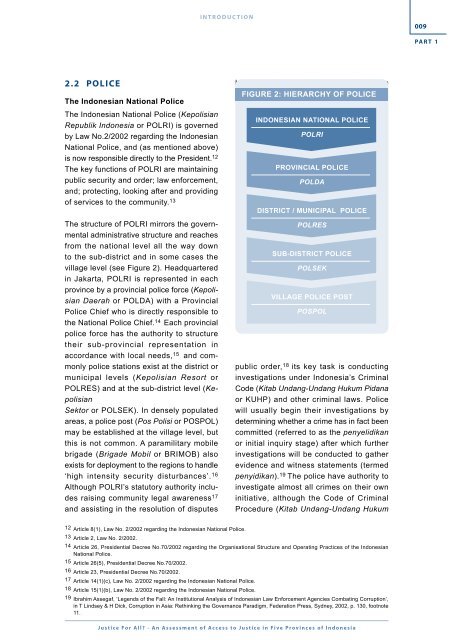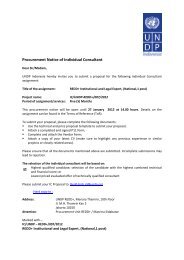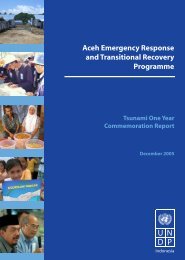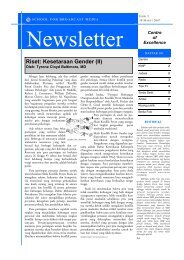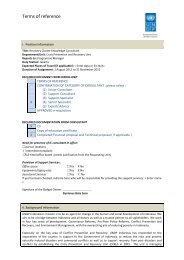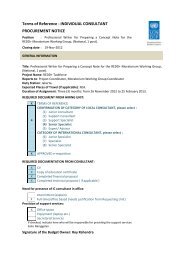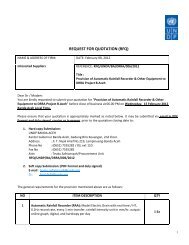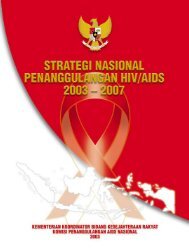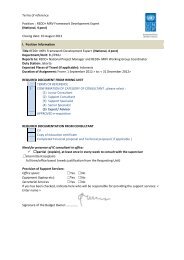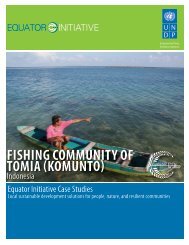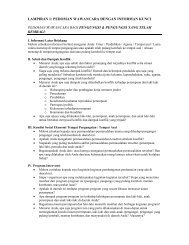Justice For All? - UNDP
Justice For All? - UNDP
Justice For All? - UNDP
Create successful ePaper yourself
Turn your PDF publications into a flip-book with our unique Google optimized e-Paper software.
INTRODUCTION<br />
009<br />
PART 1<br />
2.2 POLICE<br />
The Indonesian National Police<br />
The Indonesian National Police (Kepolisian<br />
Republik Indonesia or POLRI) is governed<br />
by Law No.2/2002 regarding the Indonesian<br />
National Police, and (as mentioned above)<br />
is now responsible directly to the President. 12<br />
The key functions of POLRI are maintaining<br />
public security and order; law enforcement,<br />
and; protecting, looking after and providing<br />
of services to the community. 13<br />
The structure of POLRI mirrors the governmental<br />
administrative structure and reaches<br />
from the national level all the way down<br />
to the sub-district and in some cases the<br />
village level (see Figure 2). Headquartered<br />
in Jakarta, POLRI is represented in each<br />
province by a provincial police force (Kepolisian<br />
Daerah or POLDA) with a Provincial<br />
Police Chief who is directly responsible to<br />
the National Police Chief. 14 Each provincial<br />
police force has the authority to structure<br />
their sub-provincial representation in<br />
accordance with local needs, 15 and commonly<br />
police stations exist at the district or<br />
municipal levels (Kepolisian Resort or<br />
POLRES) and at the sub-district level (Kepolisian<br />
Sektor or POLSEK). In densely populated<br />
areas, a police post (Pos Polisi or POSPOL)<br />
may be established at the village level, but<br />
this is not common. A paramilitary mobile<br />
brigade (Brigade Mobil or BRIMOB) also<br />
exists for deployment to the regions to handle<br />
‘high intensity security disturbances’. 16<br />
Although POLRI’s statutory authority includes<br />
raising community legal awareness 17<br />
and assisting in the resolution of disputes<br />
between citizens which pose a threat to<br />
FIGURE 2: HIERARCHY OF POLICE<br />
INDONESIAN NATIONAL POLICE<br />
POLRI<br />
PROVINCIAL POLICE<br />
POLDA<br />
DISTRICT / MUNICIPAL POLICE<br />
POLRES<br />
SUB-DISTRICT POLICE<br />
POLSEK<br />
VILLAGE POLICE POST<br />
POSPOL<br />
public order, 18 its key task is conducting<br />
investigations under Indonesia’s Criminal<br />
Code (Kitab Undang-Undang Hukum Pidana<br />
or KUHP) and other criminal laws. Police<br />
will usually begin their investigations by<br />
determining whether a crime has in fact been<br />
committed (referred to as the penyelidikan<br />
or initial inquiry stage) after which further<br />
investigations will be conducted to gather<br />
evidence and witness statements (termed<br />
penyidikan). 19 The police have authority to<br />
investigate almost all crimes on their own<br />
initiative, although the Code of Criminal<br />
Procedure (Kitab Undang-Undang Hukum<br />
12 Article 8(1), Law No. 2/2002 regarding the Indonesian National Police.<br />
13 Article 2, Law No. 2/2002.<br />
14 Article 26, Presidential Decree No.70/2002 regarding the Organisational Structure and Operating Practices of the Indonesian<br />
National Police.<br />
15 Article 26(5), Presidential Decree No.70/2002.<br />
16 Article 23, Presidential Decree No.70/2002.<br />
17 Article 14(1)(c), Law No. 2/2002 regarding the Indonesian National Police.<br />
18 Article 15(1)(b), Law No. 2/2002 regarding the Indonesian National Police.<br />
19 Ibrahim Assegaf, ‘Legends of the Fall: An Institutional Analysis of Indonesian Law Enforcement Agencies Combating Corruption’,<br />
in T Lindsey & H Dick, Corruption in Asia: Rethinking the Governance Paradigm, Federation Press, Sydney, 2002, p. 130, footnote<br />
11.<br />
<strong>Justice</strong> <strong>For</strong> <strong>All</strong>? - An Assessment of Access to <strong>Justice</strong> in Five Provinces of Indonesia


